The practice of “social confinement”:
political, sociological and cultural dimensions (São Paulo, 2020)
DOI:
https://doi.org/10.34019/2318-101X.2022.v17.34777Abstract
This article adresses certain political, sociological and cultural conditions of practicing “social confinement”, as a non-pharmacological and preventive measure to the spread of the “Corona Virus Disease” (COVID-19), in São Paulo. It is based on the answers given by 4118 individuals, over 18 years old, to a questionnaire that circulated online, between April and July 2020. Initially, the article discusses the voluntary and non-mandatory nature of adherence to “social confinement”, in Brazil. Then, it presents the profile of the respondents, highlighting, in particular, their education. The objective is to investigate the possible incidence of this factor on the defining behaviors of social isolation – that is: remaining in or leaving home – as well as on the judgments about them. The article notes a certain advantage for individuals with more education, since they not only access information about the disease, but are also more likely to incorporate it in their reactions. On the other hand, it notes that these individuals are also more lenient in evaluating their behaviors. The reasons for this are discussed based on the theoretical perspective of Pierre Bourdieu and Luc Boltanski.








